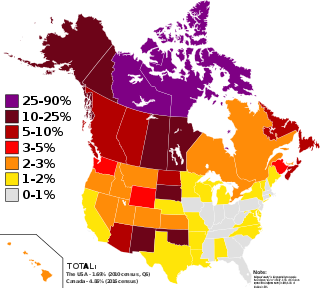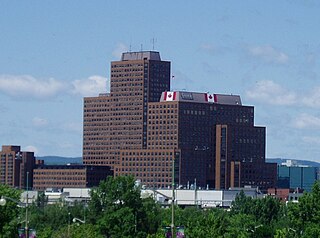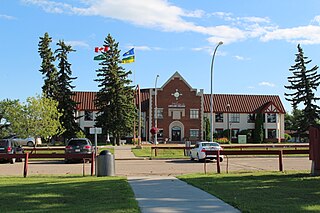
Indigenous peoples in Canada are the Indigenous peoples within the boundaries of Canada. They comprise the First Nations, Inuit and Métis. Although Indian is a term still commonly used in legal documents, the descriptors Indian and Eskimo have fallen into disuse in Canada, and most consider them to be pejorative. Aboriginal peoples as a collective noun is a specific term of art used in some legal documents, including the Constitution Act, 1982, though in most Indigenous circles Aboriginal has also fallen into disfavour.

The minister of Crown–Indigenous relations is a minister of the Crown in the Canadian Cabinet, one of two ministers who administer Crown-Indigenous Relations and Northern Affairs Canada (CIRNAC), the department of the Government of Canada which is responsible for administering the Indian Act and other legislation dealing with "Indians and lands reserved for the Indians" under subsection 91(24) of the Constitution Act, 1867. The minister is also more broadly responsible for overall relations between the federal government and First Nations, Métis, and Inuit.

The Department of Crown-Indigenous Relations and Northern Affairs is the department of the Government of Canada responsible for Canada's northern lands and territories, and one of two departments with responsibility for policies relating to Indigenous peoples in Canada.
The Gabriel Dumont Institute (GDI), formally the Gabriel Dumont Institute of Native Studies and Applied Research Inc., is a non-profit corporation serving the educational and cultural needs of the Saskatchewan Métis and Non-Status Indian community, and is the officially-designated education arm of the Métis Nation—Saskatchewan (MN-S).
The Indspire Awards, until 2012 the National Aboriginal Achievement Awards, are annual awards presented by Indspire in Canada. The awards are intended to celebrate and encourage excellence in the Aboriginal community.
Yukon University is a public university in the Canadian territory of the Yukon. The university main campus is based in Whitehorse, although the institution also operates 12 campuses throughout the territory. The university confers bachelor's degrees, diplomas, certificates as well as trades and vocational training and adult basic education. The institution is currently the only university based in northern Canada.
Aurora College, formerly Arctic College, is a college located in the Northwest Territories, Canada with campuses in Inuvik, Fort Smith and Yellowknife. They have learning centres in 23 communities in the NWT. The head office for Aurora College is located in Fort Smith.
SAY Magazine is Indigenous lifestyle Magazine, publishing stories about Indigenous Peoples predominantly in North America. The magazine was started in 2002, and focuses on telling positive stories about Indigenous people, organizations, and communities. As a bi-monthly publication, it is published six times per year. SAY Magazine is a contemporary lifestyle publication that celebrates First Nations, Métis and Inuit ingenuity by sharing success stories and stories of resilience. It is a variety publication that covers multiple topic areas including business, education, culture and language, law and justice, arts and entertainment, sports and wellness, as well as grassroots community initiatives. In addition to 4 seasonal issues, SAY Magazine publishes a post-secondary Indigenous Education Guide provided free of charge to secondary schools to help guide students in their higher education choices.
Northern Lights College is an institution that provides post-secondary education to residents of Northern British Columbia. It currently has campuses and access centers in eight communities across the northern third of British Columbia, with Regional Administration located on the Dawson Creek campus. NLC has a working agreement with the University of Northern British Columbia. The college President and CEO is Dr. Bryn Kulmatycki.

Lakeland College is a post-secondary college in Alberta, Canada. It is publicly funded, and maintains two campuses in Vermilion and Lloydminster. Lakeland serves over 7,000 students through the academic year with 2,223 studying full- and part-time.
Portage College is a public board-governed community college in Lac La Biche, Alberta, Canada. Portage has seven campus locations throughout northeastern Alberta.
The Canadian Indian Health Transfer Policy provides a framework for the assumption of control of health services by Indigenous peoples in Canada and set forth a developmental approach to transfer centred on the concept of self-determination in health. Through this process, the decision to enter into transfer discussions with Health Canada rests with each community. Once involved in transfer, communities are able to take control of health program responsibilities at a pace determined by their individual circumstances and health management capabilities.
Over the course of centuries, many Indigenous Canadians have played a critical role in shaping the history of Canada. From art and music, to law and government, to sports and war; Indigenous customs and culture have had a strong influences on defining Canadian culture. The Indspire Awards are the annual awards presented by Indspire, formerly the National Aboriginal Achievement Foundation. The awards were first established in 1993 in conjunction with the United Nations declaring the 1990s "International Decade of the World's Indigenous peoples". June 21 is Canada's National Aboriginal Day, in recognition of the cultural contributions made by Canada's indigenous population. The day was first celebrated in 1996 following Governor General of Canada Roméo LeBlanc's proclamation.
The following is an alphabetical list of topics related to Indigenous peoples in Canada, comprising the First Nations, Inuit and Métis peoples.
Indigenous or Aboriginal self-government refers to proposals to give governments representing the Indigenous peoples in Canada greater powers of government. These proposals range from giving Aboriginal governments powers similar to that of local governments in Canada to demands that Indigenous governments be recognized as sovereign, and capable of "nation-to-nation" negotiations as legal equals to the Crown, as well as many other variations.

The Aboriginal Healing Foundation was established in 1998 as an Indigenous managed, non-profit corporation dedicated to responding to the legacy of residential schools in Canada and the associated community health impacts. Funding for the Aboriginal Healing Foundation ceased in 2014.
Youth Indigenize the Senate is an initiative of the Senate of Canada wherein Canadians nominate Indigenous youth leaders from across Canada to share their ideas and experiences with the Senate Committee on Aboriginal Peoples during an official public hearing, taking place annually in June.

The Indigenous Peoples Atlas of Canada is an English and French educational resource created by the Royal Canadian Geographical Society, published by Canadian Geographic, and funded by the Government of Canada. It was created to address calls to action from the Truth and Reconciliation Commission, among them the development of "culturally appropriate curricula" for Aboriginal Canadian students. Its content includes information about indigenous lands, languages, communities, treaties, and cultures, and topics such as the Canadian Indian residential school system, racism, and cultural appropriation.
The Aboriginal Sport Circle (ASC) is a not-for-profit organization that was founded in 1995. It is designated as Canada's governing body and voice for Aboriginal sport throughout the country. The ASC brings together the athletic interests of First Nations, Inuit, and Metis communities, to increase and promote physical health among indigenous populations. The ASC also gives out the national Tom Longboat Award to the outstanding male and female Aboriginal athlete in Canada each year.
Indigenous education in Canada refers to education in Canada for First Nations, Inuit, and Métis, also known collectively as Indigenous peoples in Canada, per Section 35 of the Constitution Act, 1982 the "Aboriginal peoples of Canada", or occasionally as F.N.M.I. students.






